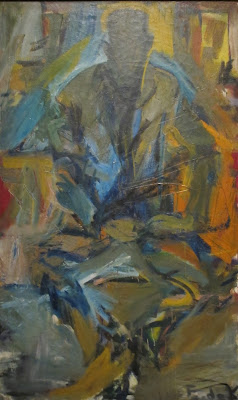The entrance to the exhibition is beautifully presented. There is a striking photo of each artist along with a section of each artist's work. Mary Abbott, Jay DeFeo, Elaine de Kooning...
Perle Fine, Helen Frankenthaler, Sonia Gechtoff, Judith Godwin,
Grace Hartigan, Lee Krasner,
Joan Michell, Deborah Remington and Ethel Schwabacher.
Looking back on the artists, you see sections of their various works.
Cornucopia - 1958 - Lee Krasner
Kranser was inspired by nature in her depiction of Cornucopia. As the wife of Jackson Pollock she once wrote, "I'm always going to be Mrs. Jackson Pollock - that's a matter of fact - (but) I painted before Pollock, during Pollock, after Pollock."
Antigone 1 - 1958 - Ethel Schwabacher
Schwabacher painted with a strong palette of colors, with emotion in which she was inspired by the Greek tragedy of Antigone.
Children of Frejus - 1959 - Sonia Gechtoff
This was Gechtoff's passionate reaction upon reading about the drowning of hundreds of children in France when a dam overflowed.
Her work was inspired by personal and current events. She said her process was "a combination of emotional reactions to just being alive." Having success in the Bay area of San Francisco, she moved to New York City in the 1950's but was amazed to find that women artist did not hold the same respect and attention as men.
Untitled - 1951 - Helen Frankenthaler
I like the this piece for the bold brush strokes and vibrant colors. There is something chaotic about this painting but organized at the same time. Later on she created a method of stain painting, she would dilute paint to create radiant washes of color on un-primed canvases. And then pour paint across the large canvas, many times laying on the floor to accomplish this. She wrote, "A really good picture looks as if it's happened at once... I think very often it takes ten over-labored efforts to produce one really beautiful wrist motion that is synchronized with your head and heart, and you have it."
Western Dream - Helen Frankenthaler - 1957
This was completed 5 years after developing her stain painting technique.
It truly evokes the wide-open landscape of the south-west. I love the subtle effect she created, to me it looks like it was painted on silk.
Imrie - Oil paint and crayon on canvas - 1953 - Mary Abbott
Bullfight - 1959 - Elaine de Kooning
Bill at St. Mark's - Elaine de Kooning - 1956
For a brief period of time, she taught in New Mexico and that experience influenced her work from then on by the color, lighting and expansive horizons of the southwest. I agree. The lighting in Santa Fe, just like San Miguel de Allende in Mexico is a painters or photographers ideal place. It is for me.
Abstraction - Elaine de Kooning - 1947
An earlier work, the bold colors are prevalent but is not as loose of a composition as her later paintings. I really like her work aall periods of her work.
The Seasons - Lee Krasner - 1957
A completely different approach in depicting nature and the female.
A very large piece, about 20 feet in length. It's a happy painting. Her works were inspired by nature, movement and architecture.
Stretched Yellow - Lee Krasner - 1955
Just coming off an exhibition that had not produced many sales, Krasner created a series of collages by applying large pieces of canvas from her older paintings onto the new canvases. I like this technique and boldness of the composition. This painting reminds me of Clifford Stills works where he has large void areas in his paintings of just raw canvas as where Krasner uses black. She said, "This act of destroying in order to create was a form of clarification... and growth."
Hudson River Day Line - Joan Mitchell - 1955.
She spent the last part of the 1950's living in Paris but she maintained ties to New York. She describes her paintings as being like poems and an approach that is quite controlled.
Interior: "The Creek" - Grace Hartingan - 1957
The painting is an obscure reaction to the furniture and setting of artist and collector Alfonso Ossorio's East Hampton estate with its intense colors and bold brushstrokes.
Image of Winter - Perle Fine - 1958
When I look at Fine's painting, I feel winter. She also was one of the few who pioneered the use of collage in her paintings to create movement and depth on the canvas. Nature, the cosmos, music and dance were her sources of inspiration.
Untitled - Deborah Remington - 1953.
A lot of energy and vibrant colors in this painting. Clyfford Still taught Remington at the California School of Fine Arts.
It must have been exciting times for these women at a time where is was hard to break into the art world and opportunities were very limited. I truly loved this show, how it was displayed, especially the signage at the entry and the biographies of each artist with black and white photos of the artist, a brief history on the artist and various quotes from the artist. I choice to highlight the paintings I particularly liked.
Denver Art Museum
The show runs through September 25, 2016.






















No comments:
Post a Comment